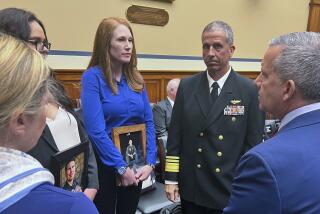Defense chief targets Air Force
- Share via
WASHINGTON — Defense Secretary Robert M. Gates said Monday that U.S. military services were not doing enough to support troops in Iraq and Afghanistan, singling out the Air Force for adapting too slowly to new enemies on those battlefields.
In unusually harsh public criticism, Gates said that his attempts to get the Pentagon to more quickly help commanders on the ground had been “like pulling teeth,” and he blamed military leaders who were “stuck in old ways of doing business.”
He said he was particularly upset with the military’s failure to get more unmanned spy planes into the air over the two war zones -- primarily an Air Force responsibility. Although the number of drones has nearly doubled in recent months, Gates has set up a task force to push for even more.
“We can do and we should do more to meet the needs of men and women fighting in the current conflicts while their outcome may still be in doubt,” Gates said. “Our services are still not moving aggressively in wartime to provide resources needed now on the battlefield.”
By delivering the rebuff in a speech at Maxwell Air Force Base in Alabama -- home to the Air Force’s premier war college -- Gates sent a clear message to the military branch, and turned what had been a fight behind closed doors into a public dispute.
The criticism comes during a tense period for Gates and the Air Force. The Defense secretary has fought a series of increasingly acrimonious internal battles against the Air Force leadership, which has pushed for dozens of new F-22 fighter planes and resisted more drone deployments. In doing so, the Air Force has failed to focus its energies on the wars at hand, Gates has charged.
The Air Force Assn., an independent advocacy group composed largely of retired Air Force officials, issued a statement shortly after Gates’ remarks insisting that the service had pushed to get more drones to war zones. Association officials said they concluded Gates “was referring to the Army” in his criticisms.
“I don’t think he’s got a lot of airmen advising him on things,” retired Air Force Lt. Gen. Michael M. Dunn, the association’s president, said in an interview. “This would be in a lot worse shape if the Air Force hadn’t gotten out ahead of it, because you can’t produce something overnight.”
Gates has previously voiced concern that the Pentagon he inherited in 2006 was not on what he called a “war footing,” and has chided other military services. He criticized the Army for its failure to send mine-resistant armored vehicles to combat zones and for its lapses at Walter Reed Army Medical Center.
Geoff Morrell, the Pentagon’s press secretary, said Gates’ complaints over unmanned drones were aimed at all services that deployed the aircraft, including the Army. “The Air Force is not immune from criticism, but it certainly isn’t alone in criticism,” Morrell said.
The remarks by Gates raised the stakes in the dispute, signaling that he considers the Air Force’s efforts to be inadequate.
“While we’ve doubled this capability in recent months, it is still not good enough,” Gates said.
To meet Gates’ demands, the Air Force has ordered pilots who operate drones to remain in current assignments and have activated all Air National Guard units that fly the aircraft.
The task force Gates set up Friday to deal with the issue is to come up with plans to deploy new reconnaissance planes every month for the next four months, according to officials who spoke on condition of anonymity when describing the group’s internal orders.
In a highly symbolic portion of his speech, Gates quoted late Air Force pilot and maverick reformer John Boyd, who for decades clashed with service brass over prized fighter programs that he deemed too complex and costly. Gates noted that Boyd championed some of the least expensive and most effective aircraft, including the F-16 fighter and the A-10 attack plane, over the objections of his superiors.
Boyd remains a highly controversial figure within the Air Force, where his theories are still debated. Yet Gates praised him as “a brilliant, eccentric and stubborn character” who should be emulated. Gates’ reference to Boyd was seen as a rebuke to the Air Force leadership and its preference for the costly F-22.
“I was stunned,” said Thomas P. Christie, a former top weapons tester at the Pentagon who was close to Boyd. “To go into the den of thieves, so to speak, and to make that presentation, I mean that’s incredible.”
Gates lauded steps by the Air Force to assist in combat. Air evacuations of wounded troops have helped increase survival rates, and airmen serve in Iraq and Afghanistan as heads of reconstruction teams and transport convoys, he said.
“Some of you have seen continuous operations in a combat theater since the day you donned the blue uniform,” Gates said. “All of you raised your right hand knowing that deployments were a fact of life.”
But addressing young Air Force officers in the audience, Gates said they must become unconventional thinkers like Boyd, challenging the military establishment.
“All the services must examine their cultures critically if we are to have the capabilities relevant and necessary to overcome the most likely threats America will face in the years to come,” he said.
--
Times staff writer Julian E. Barnes contributed to this report.
--
(BEGIN TEXT OF INFOBOX)
The wrong stuff?
Recent problems between Air Force and Pentagon leaders:
F-22s. The White House and the Pentagon have approved the purchase of 183 new F-22 Raptor fighter jets. However, many in the Air Force have continued to push for more -- at $140 million apiece. Gates has said the F-22 hasn’t flown a single mission in Iraq or Afghanistan.
Air Force ads. A $25-million campaign advertising the Air Force as “Above It All” is billed as a recruiting drive. But critics say the Air Force has few recruiting problems and is supposed to be shrinking, not growing. They suspect the ads are partly an appeal for money.
Unmanned aerial vehicles. The number of unmanned Predator drones on continuous combat patrols has increased from 12 to 22 in the last year. Gates wants more, but the Air Force has balked, saying supplying them would compromise its training program.
Investigations. Although it’s not a subject of contention, the Air Force is investigating how parts from nuclear missiles were mistakenly shipped to Taiwan in 2006. And last year, six nuclear warheads were mistakenly flown across the country on a B-52. Separately, Pentagon investigators last week criticized a $50-million contract for the Thunderbirds stunt-flying team awarded to a firm with ties to an Air Force general.
--
Source: Los Angeles Times
More to Read
Sign up for Essential California
The most important California stories and recommendations in your inbox every morning.
You may occasionally receive promotional content from the Los Angeles Times.










